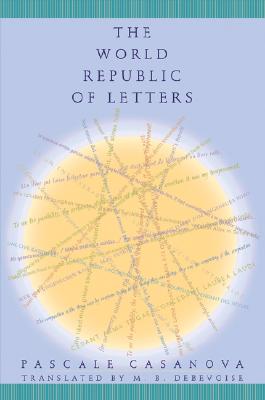Book Review: “The World Republic of Letters” — A Literary Demolition Derby
An intriguingly speculative study argues that the history of world literature boils down to a power struggle between outsiders and insiders.
The World Republic of Letters by Pascale Casanova. Translated by Malcolm Debevoise and M. B. Debevoise. Harvard University Press, Hardcover, 440pp.
By Bill Marx
“National literature is now rather an unmeaning term; the epoch of world literature is at hand, and every one must strive to hasten its approach,” declared J.W. Goethe in 1827. He was right that a global literary culture would be generated by a “commerce of ideas among peoples” led by “the translator as a mediator seeking to promote this universal spiritual commerce and setting himself the task of assisting it progress.” What Goethe missed is just how ferociously Darwinian the market place of world literature would be. On the one hand, technology has made it easier than ever before to sample writing from around the world. Yet the decline of books available in English translation suggests that, in the battle for survival, translators aren’t proving to be all that fit. Goethe’s epoch will not be coming soon.
In her enticingly speculative study, Pascale Casanova sees the history of the world republic of letters as a geopolitical demolition derby in which outsiders crash in while insiders fend off challenges to their authority as creators and arbiters of literary value. In contrast to the air-brushed display windows of book review supplements and literary magazines, authors are doomed to run in an ugly rat race — they either win renown or lose out. “It is the competition among its members that defines and unites the system while at the same time marking its limits,” she writes, “not every writer proceeds in the same way, but all writers attempt to enter the same race, and all of them struggle, albeit with unequal advantages, to attain the same goal: literary legitimacy.”
Conflicts between the powerful and the powerless and clashes among authorities protective of their turf and influence dictate the winners and losers, who is translated and who isn’t, who is reviewed and who is ignored. Over the centuries selected European countries have been acknowledged around the world as the centers of literary authority. Casanova traces the battle for domination back to the 16th century, when European vernaculars (French, English, and Spanish) asserted their independence and gained literary power by absorbing Greek and Latin models. Germany joined the club in the 18th century when Goethe supplied the aesthetic entry fee. The members fought amongst themselves for dominance until after World War II, at which point countries from around the globe demanded to be taken seriously.
For Casanova, the Darwinian set-up creates a destructive paradox. The literary power brokers in London, Paris, and New York need to find new blood, but the latter must not be so formally innovative or culturally alien as to challenge their power or perspective. Thus the new, when it is not ignored, is misinterpreted or neutered. “The World Republic of Letters” positions itself as a polemic for the overlooked: “a sort of critical weapon in the service of all deprived and dominated writers on the periphery of the literary world.” In a culture as provincial as America’s, any call for a recognition of international writing is to be commended. But, in truth, some writers are stuck on the margins because that’s where they belong, not because they are the victims of a lit-crit goon squad.
Casanova’s romanticization of the little guy as too idiosyncratic to be accepted by the mainstream leads to some strained considerations of how Kafka, Joyce, and Faulkner made their way into the mainstream. Worse, her categorization of writers and countries into top dogs and underdogs leads her into a nasty form of geopolitical correctness: a world class writer such as V.S. Naipaul is lambasted because he admires the British literary tradition rather than rebels against it. Her argument is so dependent on heroic writers jumping the barricades of staid convention that she is unable to talk about the crucial role of cooperation and alliances in the literary world that have brought attention to writers on the fringes.
But these are the inevitable questions raised by an ambitious book that proffers such a provocatively argumentative thesis. If nothing else, Casanova’s Darwinian blueprint for literary success undercuts the stereotypical image of a peaceable kingdom where herds of contented classic authors and contemporary big names graze free under the watchful eyes of sweet-tempered, open-minded shepards in the publishing and critical establishment. Written without jargon and wide-ranging in its references, “The World Republic of Letters” is a marvelously stimulating look at the realpolitik of world literature and the authorities who run the marketplace of ideas.


